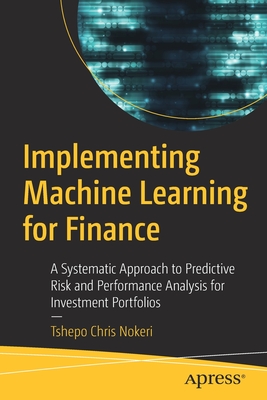Financial Signal Processing and Machine Learning
暫譯: 金融信號處理與機器學習
Ali N. Akansu (Editor), Sanjeev R. Kulkarni (Editor), Dmitry M. Malioutov (Editor)
- 出版商: IEEE
- 出版日期: 2016-05-31
- 定價: $3,940
- 售價: 9.5 折 $3,743
- 語言: 英文
- 頁數: 312
- 裝訂: Hardcover
- ISBN: 1118745671
- ISBN-13: 9781118745670
-
相關分類:
Machine Learning
立即出貨 (庫存=1)
買這商品的人也買了...
-
 Algorithmic Trading and Portfolio Management: Applications Using Advanced Statistics, Optimization, and Machine Learning Techniques
Algorithmic Trading and Portfolio Management: Applications Using Advanced Statistics, Optimization, and Machine Learning Techniques$3,600$3,420 -
 $454高效能團隊模式:支持軟件快速交付的組織架構 (Team Topologies: Organizing Business and Technology Teams for Fast Flow)
$454高效能團隊模式:支持軟件快速交付的組織架構 (Team Topologies: Organizing Business and Technology Teams for Fast Flow) -
 測試架構師修煉之道:從測試工程師到測試架構師, 2/e
測試架構師修煉之道:從測試工程師到測試架構師, 2/e$654$621 -
 多處理器編程的藝術, 2/e (The Art of Multiprocessor Programming, 2/e)
多處理器編程的藝術, 2/e (The Art of Multiprocessor Programming, 2/e)$894$849 -
 Template Metaprogramming with C++: Learn everything about C++ templates and unlock the power of template metaprogramming (Paperback)
Template Metaprogramming with C++: Learn everything about C++ templates and unlock the power of template metaprogramming (Paperback)$1,900$1,805 -
 計算機底層的秘密
計算機底層的秘密$708$673 -
 C++20 代碼整潔之道:可持續軟件開發模式實踐 (原書第2版) (Clean C++20: Sustainable Software Development Patterns and Best Practices, 2/e)
C++20 代碼整潔之道:可持續軟件開發模式實踐 (原書第2版) (Clean C++20: Sustainable Software Development Patterns and Best Practices, 2/e)$774$735 -
 $509數以達理:量化研發管理指南
$509數以達理:量化研發管理指南 -
 $2,261Automating Data Quality Monitoring: Scaling Beyond Rules with Machine Learning (Paperback)
$2,261Automating Data Quality Monitoring: Scaling Beyond Rules with Machine Learning (Paperback) -
 $301基於近鄰思想和同步模型的聚類算法
$301基於近鄰思想和同步模型的聚類算法 -
 $2,242Defensive Security Handbook: Best Practices for Securing Infrastructure (Paperback)
$2,242Defensive Security Handbook: Best Practices for Securing Infrastructure (Paperback) -
 $621C++ 之美:代碼簡潔、安全又跑得快的 30個要訣 (Beautiful C++: 30 Core Guidelines for Writing Clean, Safe, and Fast Code)
$621C++ 之美:代碼簡潔、安全又跑得快的 30個要訣 (Beautiful C++: 30 Core Guidelines for Writing Clean, Safe, and Fast Code) -
 $509邊緣計算及其資源管理技術
$509邊緣計算及其資源管理技術 -
 可觀測性入門指南:Logs、Metrics、Traces 三大實戰應用,用 24個 Lab 鞏固你的 SRE 技能樹 (iThome鐵人賽系列書)
可觀測性入門指南:Logs、Metrics、Traces 三大實戰應用,用 24個 Lab 鞏固你的 SRE 技能樹 (iThome鐵人賽系列書)$680$530
商品描述
The modern financial industry has been required to deal with large and diverse portfolios in a variety of asset classes often with limited market data available. Financial Signal Processing and Machine Learning unifies a number of recent advances made in signal processing and machine learning for the design and management of investment portfolios and financial engineering. This book bridges the gap between these disciplines, offering the latest information on key topics including characterizing statistical dependence and correlation in high dimensions, constructing effective and robust risk measures, and their use in portfolio optimization and rebalancing. The book focuses on signal processing approaches to model return, momentum, and mean reversion, addressing theoretical and implementation aspects. It highlights the connections between portfolio theory, sparse learning and compressed sensing, sparse eigen-portfolios, robust optimization, non-Gaussian data-driven risk measures, graphical models, causal analysis through temporal-causal modeling, and large-scale copula-based approaches.
Key features:
• Highlights signal processing and machine learning as key approaches to quantitative finance.
• Offers advanced mathematical tools for high-dimensional portfolio construction, monitoring, and post-trade analysis problems.
• Presents portfolio theory, sparse learning and compressed sensing, sparsity methods for investment portfolios. including eigen-portfolios, model return, momentum, mean reversion and non-Gaussian data-driven risk measures with real-world applications of these techniques.
• Includes contributions from leading researchers and practitioners in both the signal and information processing communities, and the quantitative finance community.
商品描述(中文翻譯)
現代金融業必須處理各種資產類別的大型且多樣化的投資組合,通常可用的市場數據有限。《金融信號處理與機器學習》統合了在信號處理和機器學習領域的多項最新進展,旨在設計和管理投資組合及金融工程。本書彌補了這些學科之間的差距,提供有關關鍵主題的最新資訊,包括在高維度中表徵統計依賴性和相關性、構建有效且穩健的風險度量,以及它們在投資組合優化和再平衡中的應用。本書專注於信號處理方法來建模回報、動量和均值回歸,並探討理論和實施方面。它強調了投資組合理論、稀疏學習與壓縮感知、稀疏特徵投資組合、穩健優化、非高斯數據驅動的風險度量、圖形模型、通過時間因果建模的因果分析,以及基於大規模聯合分佈的方法之間的聯繫。
主要特點:
• 突出信號處理和機器學習作為量化金融的關鍵方法。
• 提供高維投資組合構建、監控和交易後分析問題的先進數學工具。
• 介紹投資組合理論、稀疏學習與壓縮感知、投資組合的稀疏性方法,包括特徵投資組合、模型回報、動量、均值回歸和非高斯數據驅動的風險度量,並展示這些技術的實際應用。
• 包含來自信號與信息處理社群及量化金融社群的領先研究人員和實務者的貢獻。






























